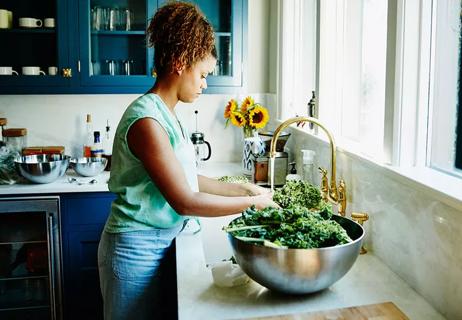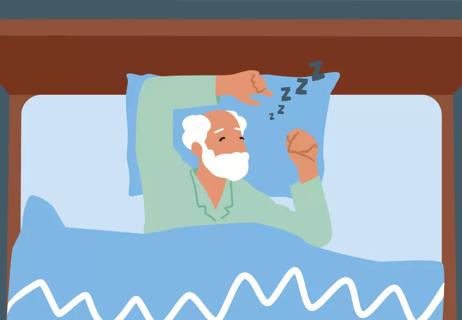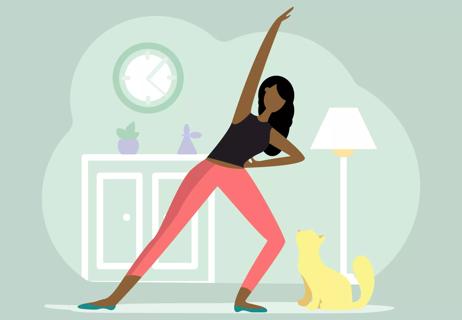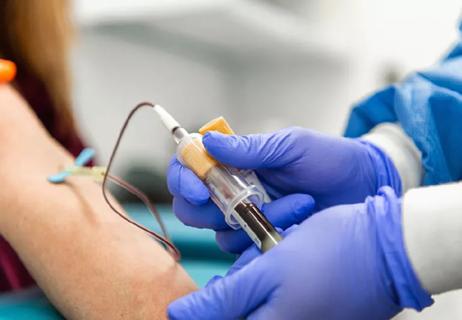The autoimmune disease can be managed with lifestyle changes and medication

It can feel overwhelming to be diagnosed with a chronic disease like rheumatoid arthritis (RA).
Advertisement
Cleveland Clinic is a non-profit academic medical center. Advertising on our site helps support our mission. We do not endorse non-Cleveland Clinic products or services. Policy
The autoimmune disease can affect the joints on both sides of your body. You may experience pain and inflammation in your fingers, hands, wrists, knees, ankles, feet and toes. RA can also more rarely cause damage to your skin, eyes, lungs and heart.
“Rheumatoid arthritis attacks various structures of the body, most commonly the joint tissues,” explains rheumatologist Matthew Bunyard, MD. “But it’s a systemic disease, so it can cause troubles outside of the joints in some cases.”
Medications are available that can not only help reduce joint pain and swelling, but also slow the progress of the disease.
Making certain lifestyle changes and having emotional support can benefit most people with RA, as well.
“With current treatments, the vast majority of patients can continue with most of their normal life activities,” says Dr. Bunyard.
Here are changes and modifications you may want to explore.
While rheumatoid arthritis affects everyone differently, some common symptoms include:
More than 1.3 million people in the U.S. have RA. It typically starts to develop between the ages of 30 and 60. Some people may have joint symptoms develop over the course of a few years, while others may have symptoms that progress rapidly.
Advertisement
Individuals with RA also experience flares, a period when they have significant symptoms like pain and fatigue.
Stress, changes in weather and certain foods may trigger an RA flare, though what causes a flare in individuals varies.
“We’re not 100% sure what triggers flares,” says Dr. Bunyard. “There’s some data to suggest that physical or emotional stressors can trigger flares. But it doesn’t always occur that way. A lot of times, there doesn’t appear to be a specific reason, which can be frustrating.”
Talk to your doctor about making lifestyle changes, which can help manage RA and flares.
Focusing on a well-balanced diet is key. Dr. Bunyard says following the Mediterranean diet is a good option.
“It’s a pretty easy diet to follow,” he adds. “Overall, you want to eat less processed foods, less sugar, less fat and less fast food.”
Both exercise and stretching play a big role in keeping yourself functional. If you’re inactive, it can lead to loss of joint motion and loss of muscle strength.
Your doctor, a physical or occupational therapist can provide information on what type of workouts are best for you.
“It’s actually important to continue to do exercise and stretching,” says Dr. Bunyard. “Some people can benefit from activities like Pilates, acupuncture and massage.”
If you have obesity, working to get to a healthier weight can help.
“You’re trying to help take the load off of weight-bearing joints like your feet, knees and hips,” says Dr. Bunyard. “By losing weight, you can actually reduce the amount of inflammation in the body.”
When you’re already dealing with pain, it can be tough to get a good night’s sleep. And when your sleep is disrupted, it can lead to more pain and fatigue.
Those with RA may benefit from using heat to increase blood circulation and help relax tissues.
“Try using a heating pad or take a hot bath or shower,” advises Dr. Bunyard. “Those sorts of things can be relaxing.”
People who smoke have a higher risk of rheumatoid arthritis.
“There are certain proteins in the body that tobacco seems to alter,” says Dr. Bunyard. “If you have rheumatoid arthritis, there are also medications that don’t work as well or have higher side effects if you smoke.”
Talk to your doctor about smoking cessation treatment options like nicotine patches, gum and lozenges.
Dealing with RA can feel like an emotional rollercoaster. Taking care of your mental health is vital when living with the ups and downs of RA.
Consider using techniques like meditation, biofeedback and cognitive behavioral therapy.
Advertisement
It’s also important to have someone you can talk to whether that’s an RA support group, a family member or a friend.
“Emotional support is necessary for human existence,” says Dr. Bunyard. “If you feel comfortable talking to someone, it can help you and also help them understand what you’re going through.”
While there isn’t a cure for rheumatoid arthritis, it can typically be managed with medication and lifestyle changes.
Depending on how severe your RA is, your doctor may recommend medication like:
“There are medications that can help with the pain of rheumatoid arthritis, help the patient become more functional, reduce inflammation and actually slow the progression of rheumatoid arthritis,” says Dr. Bunyard.
Having a lifelong illness like RA may make you feel like you don’t have control over your life. Focus on making lifestyle changes, finding a treatment option that’s right for you and talking to your doctor about any challenges you face.
“We’re trying to keep people active, employed and doing all the things that they want to do or should be doing,” assures Dr. Bunyard. “The goal of treatment is to keep people’s lives as normal as possible.”
Advertisement
Learn more about our editorial process.
Advertisement

Say yes to whole foods, lots of fruits and vegetables, and anti-inflammatory antioxidants

Having well-controlled RA at the time of conception is the key to keeping it under control while you’re pregnant

Sleep, diet and exercise can help

Diet and exercise are your best first steps

It’s not uncommon for individuals with RA to also have the blood disorder

Raspberries are packed with nutrients that can reduce inflammation and prevent chronic diseases

Adding foods like fruits, vegetables, fatty fish and whole grains to your diet may help soothe inflammation

Building a support system, adapting activities you love and following a healthy diet can all help manage symptoms and changes

Wearing a scarf, adjusting your outdoor activities and following your asthma treatment plan can help limit breathing problems

Your diet in the weeks, days and hours ahead of your race can power you to the finish line

When someone guilt trips you, they’re using emotionally manipulative behavior to try to get you to act a certain way